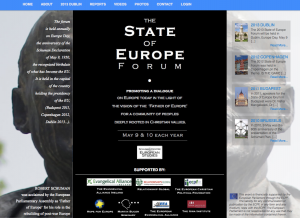 The Algerian hostage drama has given David Cameron a few extra days to think about his speech on Britain’s relationship with the European Union. Sometime this week he is expected to send a strong signal that unless things changed in the way the EU was being run the UK ‘would drift towards the exit’.
The Algerian hostage drama has given David Cameron a few extra days to think about his speech on Britain’s relationship with the European Union. Sometime this week he is expected to send a strong signal that unless things changed in the way the EU was being run the UK ‘would drift towards the exit’.
The PM’s office already released excerpts from the planned speech. Cameron would say that there was a growing gap between the EU and its citizens which represented a lack of democratic accountability and consent felt particularly acutely in Britain. Without these challenges being addressed, there was a danger Europe would fail, he was expected to say.
Many years ago, EU founding father Robert Schuman issued even stronger warnings about what would bring about the failure of the European project. The new Europe ‘cannot and must not remain an economic and technical enterprise’, he wrote, ‘it needs a soul, the conscience of its historical affinities and of its responsibilities in the present and in the future, and a political will at the service of the same human ideal’.
Again he wrote that ‘the European Movement would only be successful if future generations managed to tear themselves away from the temptation of materialism which corrupted society by cutting it off from its spiritual roots’.
Ploughshares
Dr Margriet Krijtenburg, who recently completed doctoral research on Schuman, concluded from her studies that the Christian statesman would have been aghast at the unbalanced preoccupation with economics ever since 1957, the speed of the union’s expanson and elitist decision-making which lacked transparency.
What then should we make of the state we’re in? We can’t turn back the clock, so what do we do now?
To try to address that question, each year we hold a State of Europe Forum in the capital of the country holding the EU presidency. We try to evaluate Europe today in the light of Schuman’s original vision for Europe as a ‘community of peoples deeply rooted in Christian values’. Then we ask how we can respond to the current state of affairs, in such fields as economics, politics, health, education, children’s work–as individual Christians in our workplace, and as local church communities.
We hold this forum around May 9, the date on which Schuman proposed a way in which the Germans and the French, and any other nations willing to join, could beat their swords into ploughshares by pooling thier coal and steel industries, and build a common future together. That was the recognised birthdate of what has become the European Union.
Threat
On the evening of Thursday, May 9, this year’s forum begins with a public event in Dublin’s Christ Church Cathedral, the city’s oldest building. Os Guinness, whose ancestor was the famous Dublin brewer, will address the threat to freedom in Europe by aggressive secularism’s erosion of the freedom of conscience.
Former Irish prime minister and EU ambassador to the US, John Bruton, will share thoughts on the recovery of vision and values.
The following day, Friday May 10, a full programme from morning to evening will offer space for Christian politicians, academics, economists, practitioners, church leaders, educators, childrens workers and health workers from across Europe to discuss the issues and formulate concrete responses. This will take place in the Croke Park Conference Centre, a location laden with historical connotations for the Irish.
Speakers and contributors include economists Michael Schluter and Tomas Sedlacek, politicians Sari Essayah and Ronan Mullen, academics Thomas Schirrmacher and Evert van der Poll, activists Julia Doxat-Purser and David Fieldsend, with poet and author Gerard Kelly sharing devotional thoughts.
For programme details (still being tweaked) and registration information, see the new website www.stateofeuropeforum.eu. Videos of talks from previous forums are also online via this website.
If the future of Europe is your concern, you’re welcome to join us in Dublin, May 9 &10!
Till next week,
Jeff Fountain
Till next week,
